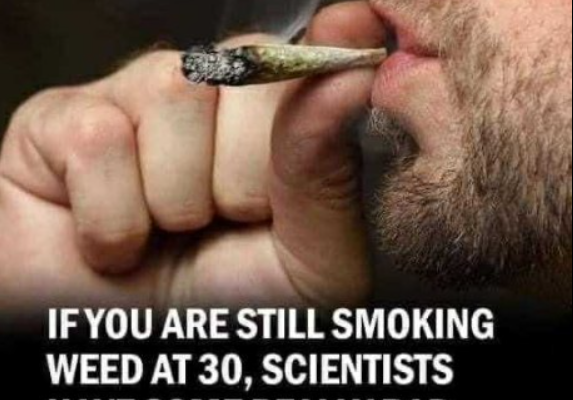
The conversation around cannabis use has changed dramatically in recent years. What was once considered taboo, illegal, and associated with negative stereotypes has now become part of mainstream discussion in many countries. With legalization spreading, more adults are openly considering or continuing cannabis use later in life. A common question arises: what does it mean to smoke weed at 30, and what do scientists actually say about it? The answer is not one-size-fits-all, as cannabis affects people differently based on genetics, frequency of use, mental health history, and lifestyle. At age 30, an individual is often at a stage where health, career, and long-term well-being are bigger priorities than in the carefree years of early adulthood. That makes the scientific findings about cannabis use at this stage in life all the more relevant.
Brain and Cognitive Effects
One of the biggest questions people have is how smoking weed affects the brain by age 30. Research shows that the human brain continues developing into the mid-20s, particularly in areas responsible for decision-making, impulse control, and memory. For people who started heavy use as teenagers, long-term cognitive impacts—such as reduced attention span and weaker memory—are more likely. By age 30, the brain has matured, meaning cannabis is less likely to interfere with ongoing development. However, scientists caution that frequent use can still impair short-term memory, reaction time, and problem-solving. Occasional users often report that these effects wear off after the high fades, but heavy, chronic use may leave lingering cognitive effects, especially if paired with sleep deprivation or stress.
Mental Health Considerations
Studies show a strong link between cannabis and mental health, but the relationship is complex. For some, smoking weed can reduce anxiety, help manage stress, and even improve mood temporarily. For others, it can worsen symptoms of depression, fuel paranoia, or trigger panic attacks. By the time someone reaches 30, many underlying mental health conditions (like generalized anxiety or bipolar disorder) are more clearly diagnosed. Scientists warn that cannabis use can sometimes mask or intensify these conditions. Heavy use has also been linked to an increased risk of psychosis in vulnerable individuals, particularly those with a family history of schizophrenia. That does not mean cannabis causes these disorders universally, but for some, it can act as a trigger. Scientists emphasize moderation and self-awareness—knowing how your mind reacts and whether weed is genuinely helping or making things worse.
Physical Health Impacts
At 30, physical health starts to matter more. Smoking weed involves inhaling combusted plant matter, which, like tobacco, exposes the lungs to tar and irritants. While cannabis smoke contains fewer harmful chemicals than cigarettes, regular smoking can still lead to chronic bronchitis symptoms, coughing, and reduced lung function over time. Scientists note that vaporizing cannabis or using edibles eliminates smoke exposure, although these alternatives come with their own risks. For example, edibles can lead to overconsumption because their effects are delayed, while vaping has raised concerns about unregulated products.
On the flip side, cannabis has therapeutic potential that appeals to adults at 30. Some use it to manage chronic pain, insomnia, or migraines. Research suggests cannabinoids can reduce inflammation, relax muscles, and improve sleep quality. For individuals juggling demanding careers, family responsibilities, or high stress, cannabis can act as a form of relaxation similar to how others use alcohol. Scientists are careful to point out, though, that reliance on cannabis for sleep or stress relief can build dependency over time.
Fertility and Family Planning
Many people in their 30s are considering starting families, and here cannabis raises additional questions. For men, studies suggest that heavy cannabis use can lower sperm count, reduce motility, and affect reproductive hormones. For women, cannabis may disrupt ovulation cycles and interfere with fertility. While occasional use has less clear long-term consequences, scientists caution that using cannabis while trying to conceive—or during pregnancy—carries risks. Cannabis can cross the placenta, and exposure in the womb has been linked to lower birth weight and developmental issues in children. For anyone planning a family, doctors strongly advise against regular use.
Professional and Lifestyle Factors
At 30, many people are settled into careers. While cannabis may be legal in some places, workplace drug policies often lag behind legislation. In industries with strict drug testing, even legal use can jeopardize employment. Scientists studying cannabis and productivity note that moderate use in off-hours does not necessarily harm career performance, but frequent use can reduce motivation, focus, and ambition—something often referred to as “amotivational syndrome.” However, this effect is debated; some argue that correlation does not mean causation, and that people predisposed to low motivation may simply gravitate toward cannabis. Regardless, the perception of cannabis use can still carry stigma in professional settings, making discretion important for many.
Addiction and Dependency
A common myth is that weed is not addictive. Scientists clarify that while cannabis does not carry the same level of physical dependency risk as alcohol, opioids, or nicotine, it can still lead to psychological dependence. Cannabis use disorder affects an estimated 1 in 10 users overall, and 1 in 6 among those who started as teenagers. Symptoms include cravings, difficulty cutting back, and prioritizing cannabis over responsibilities. By 30, many long-term users recognize patterns of dependency if they struggle to function without smoking. Withdrawal symptoms—like irritability, insomnia, and decreased appetite—are typically mild compared to harder drugs but can still be disruptive.
The Balance of Risks and Benefits
For adults at 30, scientists describe cannabis as a substance with both potential benefits and risks, depending on how it is used. Occasional, mindful use in a safe environment poses relatively low risks for most healthy adults. In fact, some studies show cannabis can enhance creativity, deepen social connections, and offer therapeutic relief from conditions like PTSD, arthritis, and chronic pain. But frequent or heavy use raises the likelihood of negative outcomes, including dependency, cognitive dulling, and mental health struggles.
Scientists stress the importance of harm reduction strategies for those who choose to use cannabis at 30:
-
Avoid daily heavy use to reduce the risk of dependence.
-
Consider alternatives to smoking, like edibles or tinctures, to protect lung health.
-
Stay mindful of mental health changes and stop use if paranoia, anxiety, or depression worsen.
-
Avoid driving or operating machinery while high, as cannabis slows reaction time.
-
If planning for children, abstain during conception and pregnancy.
Social and Cultural Shifts
Another factor at 30 is the cultural shift surrounding cannabis. Unlike previous generations, adults today often view cannabis as no more harmful than alcohol and sometimes even less so. Scientists generally agree that cannabis carries fewer long-term health risks than heavy drinking, but they caution that normalization should not minimize real consequences. As cannabis becomes more accepted, the key is education: understanding how it interacts with the body and making informed decisions about use.
Conclusion
Smoking weed at 30 is not inherently dangerous, but it comes with nuances that deserve careful thought. The science suggests that occasional, moderate use is unlikely to cause significant harm for most adults, especially compared to starting young or using daily. Still, cannabis is not risk-free: it can impair memory, trigger mental health struggles, affect fertility, and create dependency. For some, it may be a tool for relaxation and relief; for others, it may be a stumbling block to health and progress.
Ultimately, what scientists say boils down to balance and awareness. At 30, you are old enough to weigh risks against rewards, to notice how your body and mind respond, and to make conscious choices about your health. Cannabis, like alcohol, caffeine, or any substance, can be part of adult life when used responsibly—but only if approached with honesty, moderation, and respect for its power.


